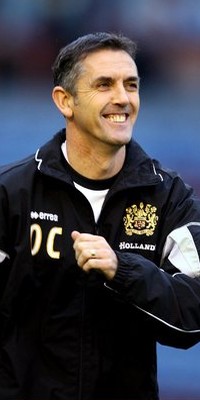|
A friend of mine who heralds from north of the border informs me that in his opinion, he satisfies 8 of the 10 requirements I advanced in this column a little under two weeks ago. That, it must be said, is a decent return.
For the record, he came up short in both experience and in his experience of the transfer market. We might as well deal with those shortcomings now, because it is impossible to deny that Coyle is a risk. His management experience amounts barely 80 games, all at a level perhaps equivalent to League Two in England, in a league which, although related, is distinct in character to the English leagues.
He has produced notable cup-successes and one good league finish, but his CV is absent of tangible success. If Steve Cotterill was rightly regarded as a risk on the back of a couple of promotions in lower league senior football and a couple of unspectacular years as a coach, then Owen Coyle must surely be more so regarded.
The news that Steve Davis is to remain at the club is to be welcomed and he will go some way to overcoming Coyle's unfamiliarity with his new battleground. Yet Davis lacks the experience and network to make yours truly feel entirely comfortable, and the decision to appoint Sandy Stewart as Assistant does not, it must be said, dispel the doubts. They might have fashioned a decent, attractive team at St Johnstone, but whether he can do the same in the face of the more powerful and athletic specimens on show in the Championship, time will tell. Tuesday's win at Watford is a promising omen.
Equally, his ability to sign the players to advance Burnley will remain a source of intrigue: his record in the transfer market was not, by accounts, at all bad up in Perth, but then he did not have responsibility for the sorts of funds which he should be entrusted with at Burnley. His ability to 'trade' - to use Brendan Flood's phrase - is untested. Meanwhile, it remains an open question whether he will be able to encourage established, accomplished players to come to Burnley.
There is, though a flip side to this coin. Because risks offer the possibility of reward. And if we are searching for our one, then it seems reasonable to assume that without a three-way marriage with vast sums of money, we aren't going to find it amongst most of the established, safe options like, by way of random example, Peter Reid.
It is probably too fanciful to run an analogy between Coyle and Arsene Wenger, not least because unless I am underestimating Brendan Flood and Barry Kilby, then Owen Coyle was not identified prior the departure of Cotterill, whereas David Dein collected chapter and verse about Wenger whilst Bruce Rioch was in the Highbury hot seat. But there is something to be drawn from the tale of the most successful appointment in recent history. Wenger was not an obvious choice, nor a man acquainted with the English way. He certainly wasn't a fans choice.
But he was the right choice. Arsenal did their homework, asked the right people, and came up with a man who could compete despite being asked to play with a set of cards inferior to those of his rivals. And so if Owen Coyle can pick better from the pool of potential talents he knows than the likes of Craig Levein or Bobby Williamson have managed before him, then he might just have the transfer strategy we have been craving.
He is reportedly well regarded in Scotland as a coach, and as a charismatic leader of men. That is a good start. Certainly, his early press performances have been impressively articulate. And if Alex McLeish, one of the elite of Scottish management circles thinks highly enough of him to take time out from a crucial international game to extol his virtues, then the chances are that reputation has spread amongst the other members of that elite. Plenty of them are already managing south of the border; the fact that McLeish has conveniently chosen this week to join them may prove a handy coincidence for Owen Coyle's Turf Moor era.
But let me go back to where I have always stood: Burnley must be different to succeed. And in a league which is increasingly full of identikit managers institutionalised in the inadequate FA coaching machine, Coyle is different. He gained his badges in a different place, in a different way, having considered different methods.
This occurred to me last Wednesday night, when I watched the flagship graduate of the FA system send out his England team to play rigid and awkward versions of 4-5-1, 4-4-2 and finally old-fashioned, long ball 4-3-3, against opponents offering creativity and craft. And as I watched England's demise, in the expectation that Owen Coyle would be unveiled at Burnley the following day, it seemed to me that appointing a man with no exposure to the FA system could prove to be no bad thing at all.

